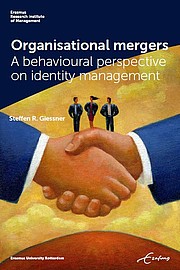Inaugural Address: Organisational Mergers – A Behavioural Perspective on Identity Management
On Friday, the 1st of April 2016, <link people steffen-giessner>Steffen Giessner, Professor of Organisational Behaviour and Change presented his inaugural address entitled ‘Organisational mergers – A behavioural perspective on identity management’.
About the Inaugural Address

Organisational mergers are one of the most extreme forms of organisational change processes. Consequently, they often result in difficulties for employees to adjust to the altered organisational conditions. This is often reflected in low levels of employee identification with the post-merger organisation. As a result, merging organisations experience more conflict, less employee motivation, higher turnover and lower performance levels. These low levels of post-merger identification thus often put the strategic and financial goals of the merger at risk. I argue that an organizational behaviour perspective focusing on the management of identity levels during an organisational merger provides important practical insights for employee management. I will first explain why I am personally so fascinated by this topic. I will then present an identity management perspective on organisational mergers. Here, I will consider three key aspects: (1) Identity processes; (2) Intergroup structure; and (3) Leadership. I will conclude by giving an overview of the potential challenges and directions for future research in this field.
About Steffen Giessner

Steffen R. Giessner is Professor of Organisational Behaviour and Change at the Rotterdam School of Management, Erasmus University (RSM). He holds an MSc in Psychology from the University of Kent at Canterbury, UK, and a PhD in Psychology from the Friedrich-Schiller-University Jena, Germany. His research is located at the intersection of organizational psychology and management. His primary research topics are employee support during organizational merger, follower’s perceptions of leadership, antecedents of leader behavior, and non-verbal communication of power. He has authored and co-authored papers in the areas of organizational behavior, management, and psychology. His research received media coverage in outlets like the New York Times, Financial Times, The Guardian, Harvard Business Review, Harvard Business Manager and Wall Street Journal.
Photos: Chris Gorzeman / Capital Images


